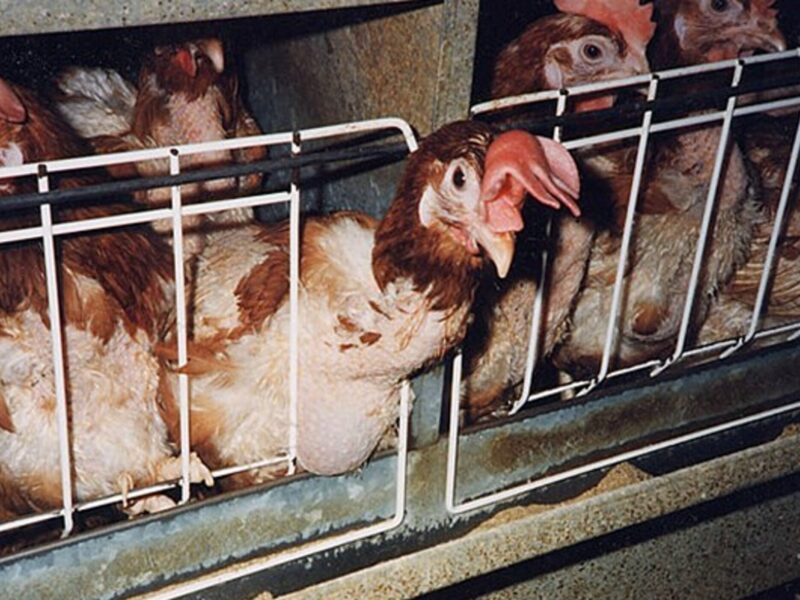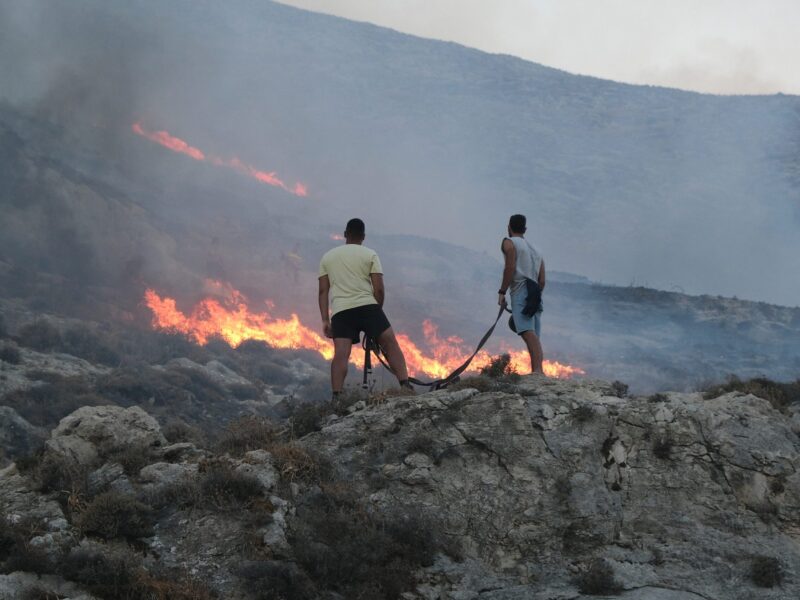
Hope and Inspiration for World Animal Day
This article is based on my recent meeting with world-renowned primatologist and foremost expert on chimpanzees Dr Jane Goodall DBE, UN Messenger for Peace, for my Big Table podcast which you can download here .
Sometimes we all look back on those seminal moments in our lives that change our destinies. For me, it was the moment that motivated me to strive to make the world a better place for animals. It was when a man called Chris Aston, from Compassion in World Farming, came to talk to my school and my teacher said he was going to tell us where our dinner came from. That day I learned about the suffering of pigs, hens and calves. It changed my world, my whole being and I resolved to spend my life standing up for animals.

Credit: Michael Neugebauer
Compassion in World Farming has been privileged to have the support of Dr Jane Goodall DBE, UN Messenger for Peace, for many years. Her renowned research into the lives of the chimpanzees of Gombe in Western Tanzania began nearly 60 years ago and her Institute, founded in 1977, now works on behalf of chimpanzees in 34 countries. Her Roots & Shoots programme involving young people in projects for the environment, people and animals is active in an incredible 101 countries. In our recent meeting in London, I asked Jane to start at her beginning and to share what sparked a change in her destiny and her interest in animals all those years ago.
Jane thought for a minute and then reflected back on her life, “I think in the womb. I was born loving all animals. In my childhood, I hear from my mother that I took worms to bed with me. But I had a supportive mother, so instead of getting angry because of course there was earth all over my nice bed, she just said ‘Jane they need the earth or they’ll die’. So we took them back into the garden and she supported this love.”

Credit: Martin Usborne
I found out about how Jane’s path to science was helped along by a hen. On a family holiday Jane went missing and even the police were called out to find her. Jane had followed a hen to her nest box to watch her lay eggs. “I waited … for over 4 hours and nobody knew where I was … And imagine, my Mother’s out searching, it’s beginning to get evening and she sees this little girl rushing towards her. Well how many mothers would have seized that child and said, ‘Where have you been? How dare you go off without telling us?’, which would have crushed that excitement. So, if you think about that, isn’t that the making of a little scientist, the curiosity, asking questions, not getting the right answer, deciding to find out for yourself, making a mistake, not giving up and learning patience. And a different mother might have crushed that early scientific curiosity, so, that moment with the hen was really, really pivotal in my life I think.”
In the early 1960s at Cambridge University, Jane was criticised for having given the Gombe chimps names, for describing their personalities and their use of tools. “I was shocked, and devastated actually, to be told by these erudite professors I’d done everything wrong. I shouldn’t have given the chimps names. It wasn’t scientific, they should have had numbers and I couldn’t talk about them having personalities, minds or especially emotions because those were unique to us. And it really was thought by science back then that the difference between us and other animals was the difference of kind, probably triggered in a way by religion I suspect, some religions. I don’t know, but anyway, it was devastating. But I’d had this teacher when I was a child who taught me that in this respect these erudite professors were definitely wrong and that teacher was my dog, Rusty.”
Jane’s transformation from scientist to an activist took place at a 1986 conference on chimpanzees in the Chicago Academy of Sciences, “… we had a session on conservation. Shocking, everywhere, every field site, trees going, forests disappearing, chimp numbers dropping, beginning of the bush meat trade, the commercial hunting of wild animals for life for food and it was just awful. Chimps caught in wire snares, losing their hand or their foot or dying of gangrene and by then we’d begun to understand the close biological similarities … We also had a session on conditions in some captive situations, secretly filmed footage of the pre-training of circus entertainment chimps. Little infants being beaten and medical research labs. Our closest relatives in 5ft by 5ft cages and I went to that conference as a scientist, I built up a research station, my life was better than anything I could have dreamed of. I had time to be in the rainforest and with the chimps, who by then I knew so, so well. They were almost like, it wasn’t family, I can’t describe it, but very close and I left as an activist. I didn’t make a conscious decision, I just knew I had to do something.”
Jane’s decision to do something meant that she has spent the past three decades travelling the world taking action and inspiring others. Her Roots & Shoots programme, which inspires young people to take part in environmental, conservation and humanitarian projects, began in Tanzania with students from a High School. “We had a big meeting and from it this Roots & Shoots programme was born. With the main message, every single one of us makes some impact on the planet every single day and we have a choice as to what kind of impact we’re going to make. So think about the consequences of what you buy, eat. Weigh, where did it come from, how was it made, did it involve animal suffering, is it cheap because of child slave labour, did it harm the environment? So when hundreds, then thousands, then millions, then billions of people make ethical choices then we’ll start moving towards a better world.”
 Jane and I discussed many other issues including factory farming, her decision to stop eating meat and Compassion’s call for UN action on food and farming. I’ll return to some of these issues in another article soon! For now I’d urge you to download the podcast and to listen to Jane’s reflections and our conversation.
Jane and I discussed many other issues including factory farming, her decision to stop eating meat and Compassion’s call for UN action on food and farming. I’ll return to some of these issues in another article soon! For now I’d urge you to download the podcast and to listen to Jane’s reflections and our conversation.
I’m delighted to share and announce that following our conversation, Jane and I agreed a new strategic partnership between Compassion in World Farming and Roots & Shoots. Our aim is to work together on behalf of animals, people and the environment.
Jane, thank you so much. I feel humbled and privileged to have had so much of your time and look forward to working with Roots & Shoots.





